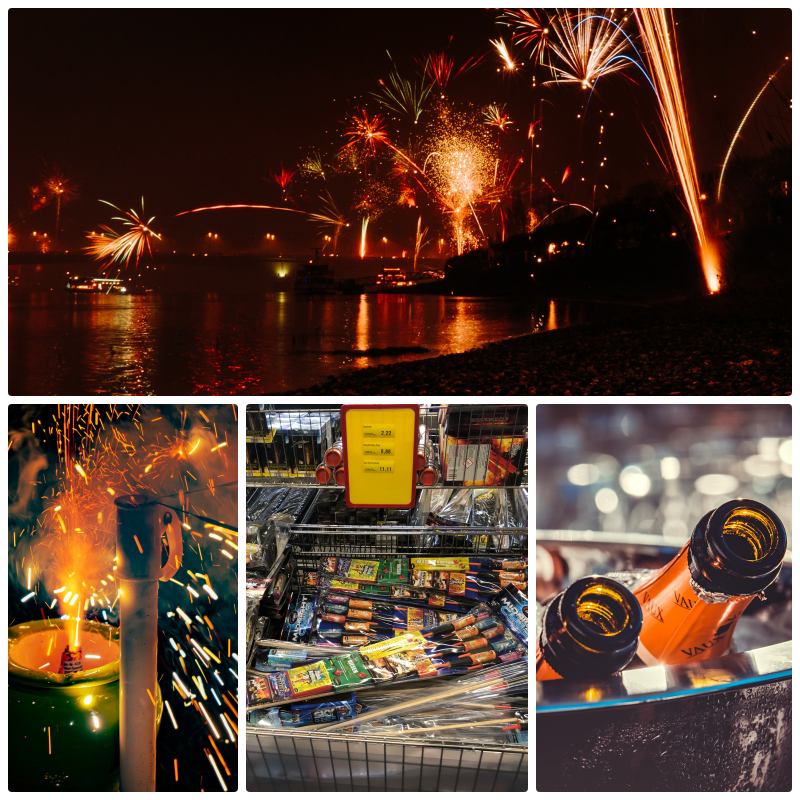Does Germany Have A Fireworks Problem?
Despite growing up in a largely safe middle class environment, my childhood seemed to be filled with an abundance of threats to my wellbeing. The most obvious came in the form of my three older siblings who, as tradition dictates, enjoyed devising medieval punishments for their youngest brother. Following closely behind these three, there were stinging nettles, the scary looking kids who lived across the road, and my unshakable belief that a werewolf lived under my bed. Surely this was enough peril for any small child to deal with, but I grew up in 80s Britain, a time when scaring children into compliance was still seen as a viable educational tool. Every November, as the 5th and Bonfire Night approached, my entire primary school was marched into the hall and collectively terrified by an incredibly stern, and from our perspective giant, policeman who would explain in blood curdling detail why we shouldn’t play with fireworks.
After a couple of years of lectures on the difficulties of doing homework after you blow your hands off with a bottle rocket, the BBC suddenly ramped up the terror by distributing public information films to schools, further illustrating the dangers of fireworks. Instead of imagining the worst case scenario as described by Police Officer Stern-Giant, we also had to sit through a shockingly vivid 20-minute video that followed a child who stole a firework and then, in harrowing 80s fashion, blew himself up to the sounds of jolting synth music. For years after, I’d become incredibly anxious when I heard a firework, or listened to Gary Numan. Although I eventually grew to love the synthesiser, I’ve never grown to love fireworks.
In retrospect, I suppose all the firework fear I was subjected to actually worked. At the time of writing, I‘m on a 40 year hot streak of not being blown up and, thankfully, I still have all my fingers. I also know some important firework etiquette, such as never returning to a lit firework, or that sparklers should be handled with gloves and extinguished in a bucket of sand. Most importantly, I know that throwing fireworks may sound like good fun, but it will inevitably lead to a visit to an A&E, and most likely, some form of dismemberment.
These were lessons I naively assumed all children learned at some point. It never occurred to me that some countries would take anything but a safety-first approach to handling fireworks, and I certainly assumed Germany, with its supposed love of rules and regulations, would fall into the category of careful and cautious enjoyers of fireworks. However, I really couldn’t have been further from the truth.
For example, the process of buying fireworks in the UK is tightly controlled. The purchaser must be 18 years or older, and even if you are a wizened crone, you’ll still have to present ID. Once you have confirmed your age, you are then required to give your name and address, which is documented and stored. Once the paperwork is complete the fireworks, which are stored in a locked cabinet, can be sold to you. Contrast this bureaucracy with Germany, where fireworks are divided into four age classes:
• Class 1- low level bangers (3 grams of explosive) can be sold to ages 12 and over.
• Class 2- Slightly more powerful, fuse lit fireworks can be sold to over 16s.
• Class 3- Rockets and larger fireworks, sold to those 18 and over.
• Class 4- Professional fireworks, only sold to technicians and experts.
Of course, ID is required to purchase, but there is no logging of names and no locked cabinets. My mind was blown the first time I saw packets of rockets on sale in a German supermarket, in large bins that were placed, ominously, next to the crates of beer.
Now, at first glance, the German categorisation of fireworks seems fine, it sets age limits and restricts access, but like so many rules and regulations in Germany, it often feels like the people making them have never considered how they function in the real world. There is a general assumption, spelled out by the lack of any serious safety notices in shops or national awareness campaigns about safe handling, that people won’t do anything stupid. There’s an argument that Germany is more mature than the UK and its population can be trusted to not blow themselves up. It might even be argued, based on how the British treat fireworks, that the UK is a nanny state where regulations prevent people from having fun. However, this misses an important point - how Germans perceive rules.
What you see with firework rules is similar to what you see on the Autobahn. When there are rules, they are generally followed, maybe twisted a little, possibly bent slightly, but followed. When you tell Germany that there are no rules (or no speed limits), only guidelines that should be observed, you’re telling Germany that there are no rules. And when you tell Germany that, you’re really gambling. Setting age limits as low as 12 years old simply says to most adults that there are categories of firework that are harmless, so much so that they can be given to children. The result is Germans seem to treat fireworks as harmless fun and not as the colourfully packaged IEDs that they are. This was so very clearly underlined the first time I spent New Year in Germany.
My first Silvester (German New Year’s Eve) was in Stuttgart. We were invited to a party, but as it neared midnight, we left the safe confines of the venue, and headed out into the streets. Germans, especially those in large cities, often congregate in the central square or other open spaces to ring in the new year together. As we left the party, I was confronted with chaos on all sides. Children merrily hurled what appeared to be small sticks of dynamite at each other, as if they were snowballs. One industrious child had taped several bangers together and was casually throwing them at passers-by. Once we had manoeuvred our way through these miniature urban guerrillas, we entered the Hauptmarkt to find hundreds of people, all merrily firing rockets into the air. Disregarding all standards of safety, they happily held burning rockets in their hands, lighting them with cigarettes as if they were all so many Clint Eastwoods. The rockets would sometimes fire into the sky, but more frequently, they went into buildings and unnervingly close to other groups of people. When this happened, there would be hoots of laughter at the potential maiming that had been narrowly avoided. I was dumbfounded.
What concerns me more than anything is the growing evidence that Germany has a problem when it comes to fireworks. Every year, hospitals across the country plead with the population to act with more care, but annually they are ignored. Statistics suggest that drunken men are the most likely to be maimed by fireworks, but more shockingly, children are often in a “second wave” that comes on New Year’s Day, when they find active fireworks that have been discarded, or fireworks that failed to explode. All of this could be avoided with some basic education on firework handling, but as of now, that seems unlikely to happen on an organised scale.
Proofreader: @ScandiTina
Image Credit
Photo by Erwan Hesry on Unsplash
Photo by Patrick Pahlke on Unsplash
Photo by Markus Winkler on Unsplash
Photo by Mika Baumeister on Unsplash
Photo by Ilona Frey on Unsplash
Photo by Christian Lue on Unsplash







